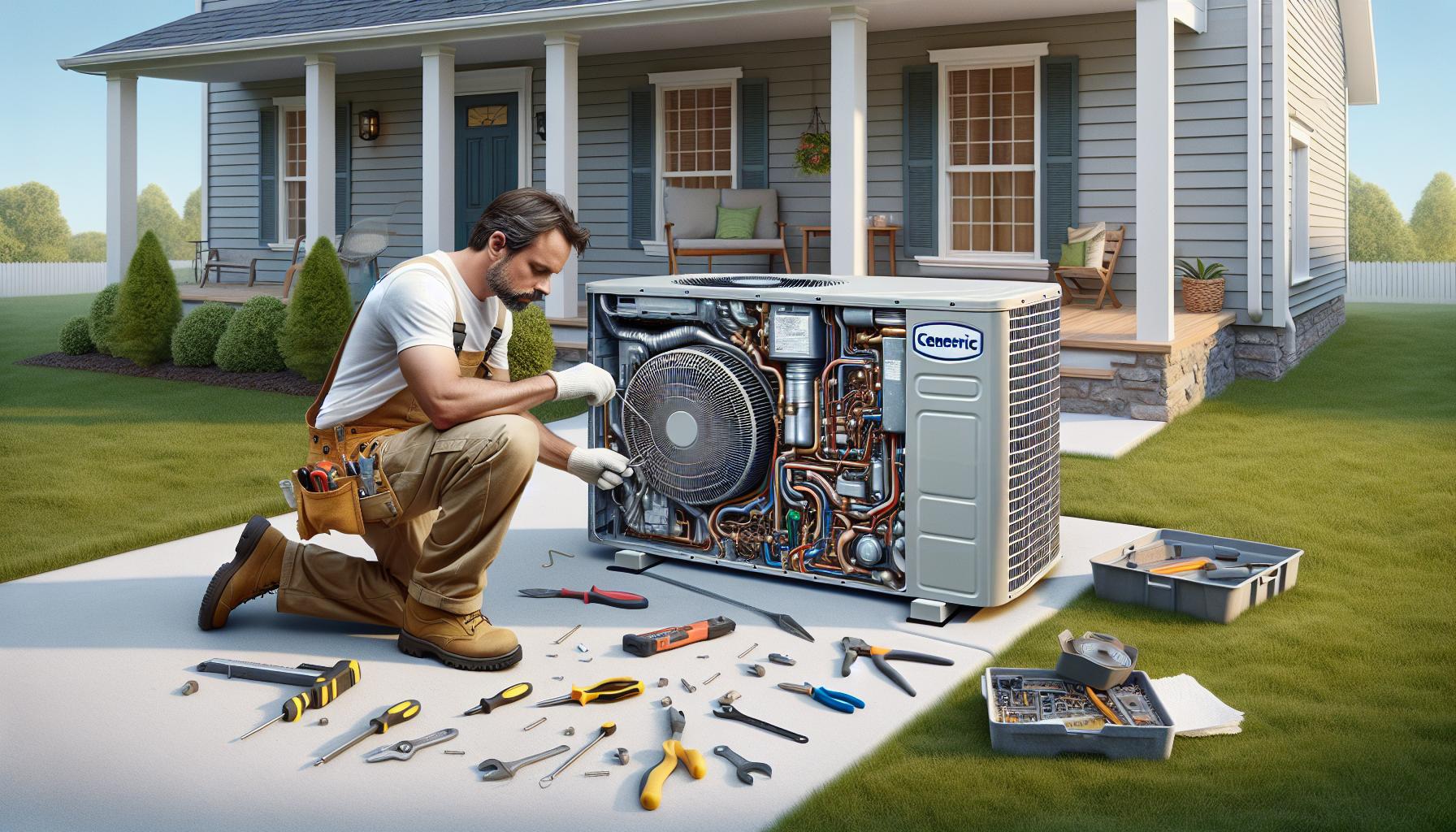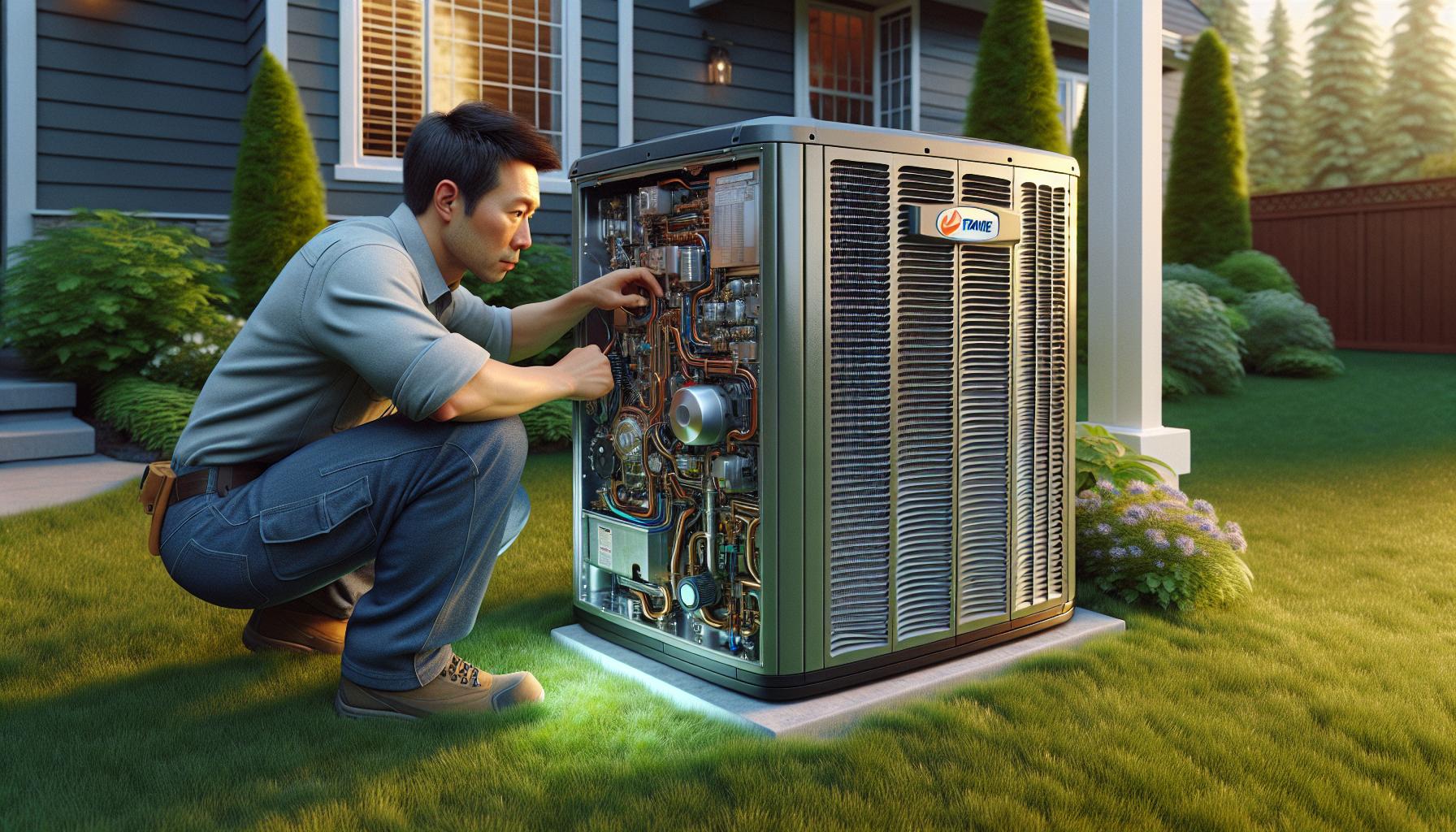When your Trane air conditioner starts acting up, it can quickly turn a comfortable home into a sweltering ordeal. Understanding common issues with Trane AC units not only helps you troubleshoot but also ensures you can communicate effectively with repair professionals. This article delves into the most frequent Trane AC problems, from minor glitches to more serious malfunctions.
You’ll discover why your Trane AC might be blowing warm air, making unusual noises, or failing to turn on altogether. By identifying these issues early, you can avoid costly repairs and extend the lifespan of your unit. So, let’s explore the typical problems you might face and how to address them, ensuring your home stays cool and comfortable year-round.
Common Problems With Trane AC Units
Understanding common issues with Trane AC units helps you troubleshoot effectively. This section covers the main problems you might encounter.
System Not Cooling Properly
Several factors can cause your Trane AC to fail at cooling. Check if the thermostat is set correctly and has functioning batteries. Low refrigerant levels might indicate a leak, while frozen evaporator coils can result from poor airflow or low refrigerant. Dirty filters and coils also hinder cooling efficiency.
Strange Noises
Unusual noises from your Trane AC can indicate mechanical problems. Rattling sounds might mean loose parts, while hissing could signal a refrigerant leak. Squealing or grinding noises often relate to motor or fan issues. Promptly address these sounds to prevent further damage.
Poor Airflow
Poor airflow reduces your AC’s effectiveness. Clogged or dirty filters are common culprits, as are blocked vents and ducts. Inspect the blower motor and ensure it’s functioning properly. Regular maintenance helps maintain optimal airflow and system performance.
Unpleasant Odours
Bad smells from your AC can stem from various issues. Musty odours suggest mould or mildew growth, often due to excess moisture. Burning smells might indicate electrical problems, while rotten egg odours could point to a gas leak. Identifying and resolving the source quickly ensures a healthy indoor environment.
Troubleshooting Trane AC Issues

When encountering problems with your Trane air conditioner, several common issues can be identified and resolved through basic troubleshooting steps. Here are some key areas to focus on:
Checking Thermostat Settings
Ensure your thermostat is in “cool” mode, not heating mode. Lower the temperature to check system response. If your thermostat uses batteries, replace them if necessary.
Inspecting Air Filters
Clogged air filters can restrict airflow, causing low airflow and increased energy bills. Check and replace dirty filters to prevent these issues.
Examining Circuit Breakers
Verify that the circuit breaker for your AC unit hasn’t tripped. Reset it if needed but if it trips again, consult a professional as it may indicate a larger issue.
Investigating Refrigerant Levels
Low refrigerant levels can prevent your AC from cooling properly. Check for leaks and consult a professional for recharging the system if needed.
When To Call A Professional
Knowing when to call a professional for your Trane AC problems can save you time and prevent further damage. Below are some specific issues that require expert attention.
Circuit Breaker Issues
If the circuit breaker continues to trip, it might signal an overload or electrical issue. Contact an electrician to prevent further electrical problems and ensure safety.
Frozen Evaporator Coil
A frozen evaporator coil can stop the air conditioning unit from functioning properly. This requires professional help to thaw the coil and diagnose the underlying cause.
Defective Run Capacitor
A faulty run capacitor can prevent the AC system from starting or cause it to shut down. Given the electrical charge involved, it’s recommended to call a professional for replacement.
Broken Fan Blade
A broken fan blade in the outdoor unit can cause unusual noises and imbalance. Keep the system off and contact a professional for assistance to avoid further damage.
Signs Of Major Issues
- Warm Air: If your AC blows warm air, it could be a sign of low refrigerant or compressor issues.
- Unusual Noises: Strange noises may indicate mechanical problems or loose components.
- Poor Airflow: Blocked ducts or dirty filters can cause inadequate airflow.
- Unpleasant Odours: Mould growth or electrical problems can produce odd smells.
- Filter Replacement: Replace air filters every 1-3 months to maintain airflow.
- Thermostat Check: Ensure the thermostat is set to “cool” mode and working properly.
- Inspect Ducts: Regularly check ducts for blockages or leaks.
- Schedule Tune-Ups: Have a professional inspect your system annually for optimal performance.
Tips For Preventing Future Problems
Preventing issues with your Trane air conditioner ensures it runs efficiently. Regular maintenance, proper usage, and timely checks can save you from costly repairs and discomfort.
- Regular Maintenance:
- Schedule annual tune-ups with a professional technician. Regular maintenance checks can identify potential problems early and keep your AC running smoothly.
- Example: A technician can spot a worn-out fan blade that, if left unchecked, could lead to motor failure.
- Clean Air Filters:
- Replace or clean air filters every 1-3 months. Clean filters improve airflow and efficiency, reducing strain on the system.
- Example: A clean filter can prevent the evaporator coil from freezing due to restricted airflow.
- Check Refrigerant Levels:
- Ensure refrigerant levels are adequate. Low refrigerant can cause the system to work harder and may lead to a frozen evaporator coil.
- Example: Regular refrigerant checks can prevent leaks that might otherwise go unnoticed until they cause major issues.
- Inspect Ductwork:
- Regularly check ductwork for leaks or blockages. Proper airflow is crucial for efficient cooling and system longevity.
- Example: Sealing duct leaks can improve cooling efficiency and reduce energy bills.
- Monitor Thermostat Settings:
- Keep an eye on your thermostat settings. Incorrect settings can cause your AC to overwork and lead to premature wear and tear.
- Example: Setting the thermostat to an appropriate temperature can prevent the system from running constantly, reducing wear.
- Clear Outdoor Unit:
- Ensure the outdoor unit is free from debris and vegetation. Good airflow around the unit helps maintain efficient operation.
- Example: Trimming plants around the unit can prevent blockages and improve performance.
- Use a Programmable Thermostat:
- Install a programmable thermostat to manage cooling efficiently. It helps in maintaining consistent temperatures and reduces unnecessary strain on the system.
- Example: Programming the thermostat to higher temperatures when you’re away can reduce energy consumption and extend the system’s lifespan.
By following these tips, you can maintain your Trane air conditioner in optimal condition, ensuring a comfortable and efficient home environment.
Conclusion
Proactively managing your Trane AC unit can save you time and money while ensuring a comfortable home environment. By recognising common issues like warm air or unusual noises and following practical troubleshooting steps, you can address many problems before they escalate.
Remember to conduct regular maintenance checks, such as replacing air filters and inspecting ductwork, to keep your system running smoothly. When in doubt, don’t hesitate to seek professional assistance for more serious concerns.
Adopting these practices will help you avoid costly repairs and extend the lifespan of your Trane air conditioner. Stay vigilant, maintain your unit, and enjoy a reliable cooling system all year round.
